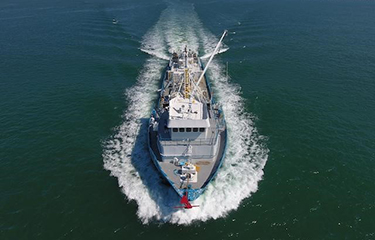Virginia Governor Ralph Northam has asked U.S. Commerce Secretary Wilbur Ross to act against a company that has exceeded the catch limit on menhaden in the Chesapeake Bay this year.
In a letter sent last week, Northam called on Ross to set a moratorium on menhaden fishing in the bay. That action comes less than a month after the Atlantic States Marine Fisheries Commission unanimously found the menhaden fishery out of compliance for surpassing the annual catch limit on the fish used for fish oils and nutraceutical products.
The commission referred the case to Ross, who will decide what action to take against the fishery.
Omega Protein, which has a processing plant in Reedville, Virginia, had previously acknowledged it harvested 67,000 metric tons of menhaden this year in the bay.
The yearly catch limit was reduced to 51,000 metric tons two years ago, down from 87,000 metric tons. However, Virginia lawmakers never passed legislation codifying the reduced quota.
Messages to Omega Protein for comment were not returned as of early afternoon on Wednesday, 27 November.
However, in a statement that criticized the ASMFC’s decision last month, the company said the 51,000-metric-ton limit was passed without scientific justification. Company officials also said the cap puts serious restraints on its operations.
“No two fishing seasons are the same, as conditions and the location of fish vary,” the company said. “The commission previously worked with stakeholders to create an episodic event set-aside to help states deal with increased local availability. Such abundance led some states to exceed their quotas, often by significant margins, without being found out of compliance. The hard cap on Bay harvests does not provide similar flexibility for such episodic abundance.”
The company initially signaled its intention to exceed the cap in September. At the time, the company protested the original change in quota that led to the reduction to 51,000 MT.
“Omega Protein has great respect for the ASMFC, its commissioners, and its staff. But this was a rare situation in which the commission made an unscientific and arbitrary recommendation, which would have resulted in either forced, unsafe fishing conditions or economic hardship for hardworking fishing families,” Omega Protein wrote at the time. “Risking our employees' safety is never a choice we will make. With our employees' livelihoods and the economic well-being of Reedville, Virginia, and the surrounding Northern Neck region on the line, shutting down operations was not a viable alternative.”
Environmental groups pushed for the quota reduction, saying menhaden play an essential role in the bay’s food chain. The small fish eat plankton and as a result prevent toxic algae blooms from occurring in the water. Menhaden also serve as an important food source for larger fish, marine mammals, and aquatic birds.
In a statement, Chesapeake Bay Foundation Senior Regional Ecosystem Scientist Chris Moore said Omega Protein gambled its workers future by exceeding the cap and added that Ross must support the commission as the Commerce Department has for nearly 80 years.
However, Moore noted there was something Virginia officials could do, too.
“Fortunately, Virginia can resolve this before the 2020 menhaden season starts in the spring,” he said. “In the upcoming General Assembly session legislators should transfer the management of the menhaden fishery to the Virginia Marine Resources Commission like every other saltwater fishery in Virginia. VMRC’s responsibility to ensure sound, science-based management will bring Virginia back into compliance so that fishing can resume as scheduled in the spring.”
Photo courtesy of Omega Protein







